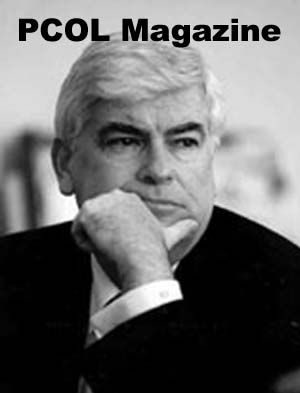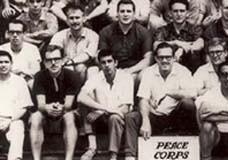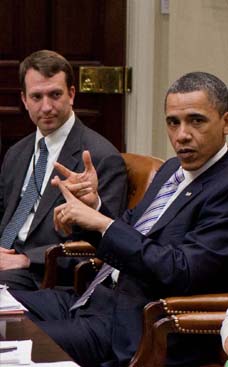
"There has also been debate over time about how large the corps of volunteers should be. President George W. Bush called for doubling the numbers of volunteers to 14,000 over a five year period. I was supportive of President Bush's call for a larger Peace Corps with the caveat that first and foremost the agency must ensure that volunteer experience wouldn't be diminished in the process. The number of volunteers has grown modestly over the last 9 years but it certainly did not double in size. In part it was a resources question. In part it was an enormous undertaking to screen more volunteers, sign on new countries and identify additional sites for volunteer placements. In light of the serious federal deficit and mounting federal debt, it may be unrealistic to believe that you will be able to find the resources to support such an expansion for the foreseeable future. Your energy may be better spent maintaining funding levels to support the 9,000 plus volunteers that are currently serving."
Testimony by Senator Christopher J. Dodd: "Peace Corps: The Next Fifty Years"
Testimony by Senator Christopher J. Dodd
Subcommittee on Western Hemisphere, Peace Corps, and Global Narcotics Affairs
Senate Foreign Relations Committee
"Peace Corps: The Next Fifty Years"
October 6, 2011
Mr. Chairman, members of the Subcommittee thank you for inviting me to share my thoughts on a subject matter near and dear to my heart – the Peace Corps. This is certainly an opportune time for the Committee to reflect on the record of the Peace Corps, as it celebrates fifty years of public service by its volunteers. Given how much the world has changed since March, 1, 1961, when President Kennedy signed the Executive Order establishing the Peace Corps, it is also an appropriate time to take stock of any challenges facing the organization so it will remain relevant and productive for the next fifty years.
Let me say at the outset that I think Aaron William, the current Peace Corps Director, is doing a fine job and is the right person to lead the organization into its next fifty years. I may be slightly biased about Aaron as his service in the Peace Corps overlapped mine in the Dominican Republic. As many of you know, I served as a Peace Corps Volunteer back in the days when I still had dark hair. Like many other Peace Corps Volunteers, I was fresh out of college and learned on the job with the support of the wonderful families in my village of Benito Monción. Together we built a school, established a maternity clinic and organized a youth clinic. I believe that these were useful endeavors for the village and that I did some good for those living there during my service. I know that I benefitted enormously from the experience and my worldview was forever after influenced by my experience as a volunteer. It is where I developed my passion for public service and it is where the seeds of my lifelong interest in Latin America first began. I have had the privilege of observing, up close, the Peace Corps over the majority of its first fifty years. I have been deeply involved with the Peace Corps for 45 of the 50 years since its creation. And let me state without reservation that it has been and remains a remarkable organization. In this city of partisan divides, the Peace Corps has always managed to stay above the fray and enjoy strong bipartisan support, and that is because the organization is at its heart all about the volunteers. More than 200,000 men and women have served in 139 countries spanning the globe. Today more than 9,000 volunteers are serving in 76 countries. Eighty-five percent of those currently serving are recent college graduates and 84% of them are under the age of 30. These demographics are much the same as when I served, with one exception: today 60% of our volunteers are women. Each one of these individuals has served or is serving, mindful of the three goals that have guided the Peace Corps' mission for the last five decades, namely to help people in interested countries meet their need for trained citizens; to help promote a better understanding of Americans on the part of the people served; and to help promote a better understanding of other peoples on the part of Americans.
Last year the Peace Corps submitted a comprehensive agency assessment of the organization to the Congress as mandated by law. Not surprisingly that assessment reaffirmed the mission of the Peace Corps as articulated by the three goals that have served it so well. The assessment also outlined six strategies for reforming and strengthening the organization as it looks ahead to the next fifty years. I would not take issue with any of these strategies. But rather than reiterating the points made in the agency's assessment, let me share with you some additional areas that merit the Committee's attention as the next fifty years of the organization gets underway. First and foremost as I stated earlier – the Peace Corps is all about the volunteers. Peace Corps management should never lose sight of that fact. And therefore this committee should be thinking creatively about how to help the agency to maximize the volunteer experience. The Committee has already acted on legislation in one critical area -- the safety and security of the volunteers -- when it reported the Kate Puzey Peace Corps Volunteer Protection Act of 2011 on July 26th of this year. This legislation is in response to the tragic murder of one volunteer and the brutal rape of another. It is intended to encourage and support the steps the agency is taking to respond appropriately and sensitively to victimized volunteers and their families. As importantly, it mandates preventative measures be taken to protect volunteers from future incidents. I was pleased to see the Senate pass this bill on September 26, and hope the House will quickly follow suit.
I know that as part of the Committee's deliberations of this legislation you struggled with the issue of the co-location of volunteers. I was the only volunteer in my community and for that reason it was a unique experience. But having said that I think there may be circumstances when co-location makes sense. I believe the agency should show flexibility and common sense in this area. It may be particularly appropriate in areas with high crime rates or when the nature of the project being undertaken is larger than one volunteer can handle. The Peace Corps itself has made great strides in protecting volunteers against sexual assault. Under Director Williams, the Peace Corps has issued a set of core principles to ensure that timely and compassionate support is available to victims of sexual assault as well as guidelines and training for responding promptly and effectively to an incident of sexual assault. In addition, the Peace Corps has created a volunteer sexual assault panel made up of outside experts and former Volunteers who were victims of sexual assault in order to provide advice and input on Peace Corps' sexual assault risk reduction and response strategies. All of these efforts are in an attempt to provide greater security and support to the volunteers spread throughout the world and the staff and directors of the Peace Corps must be supported in these efforts.
Another way to improve the volunteer experience is to institute a formal mechanism for getting feedback from volunteers and for creating opportunities for future volunteers to have access to those insights. Volunteers know better than anyone whether a site selection has been a mistake, whether a project has been poorly thought out, or whether a community really is welcoming of the volunteer. They also know whether their country director or their health and security officers are their 24/7 for them, if needed. This is all useful information that headquarters should be shifting through and paying attention to. I attempted to tackle this and several other issues legislatively in 2007 with the Peace Corps Volunteer Empowerment Act. Unfortunately the bill never became law.
There has also been debate over time about how large the corps of volunteers should be. President George W. Bush called for doubling the numbers of volunteers to 14,000 over a five year period. I was supportive of President Bush's call for a larger Peace Corps with the caveat that first and foremost the agency must ensure that volunteer experience wouldn't be diminished in the process. The number of volunteers has grown modestly over the last 9 years but it certainly did not double in size. In part it was a resources question. In part it was an enormous undertaking to screen more volunteers, sign on new countries and identify additional sites for volunteer placements. In light of the serious federal deficit and mounting federal debt, it may be unrealistic to believe that you will be able to find the resources to support such an expansion for the foreseeable future. Your energy may be better spent maintaining funding levels to support the 9,000 plus volunteers that are currently serving.
Since the Peace Corps opened its doors there has also been a debate about the so called five year rule, which places term limits on Peace Corps management and staff. The purpose of the rule has always been to keep the organization infused with fresh eyes and ideas. I for one have supported this policy because it also reinforces the concept that the organization is about the volunteers and not about management. Certainly there needs to be flexibility in certain areas, such as health and security where experience is critical. I believe the director has sufficient discretion to respond to specific requirements as they arise while still preserving the spirit of the five year rule.
The Peace Corps has done a very good job of fulfilling its first and second goals. Where it has done less well is with respect to the third goal, namely promoting a better understanding of other peoples on the part of Americans. Yes, there is the Paul Coverdell World Wise School program. But the resources allocated to that program and other third goal activities are miniscule. In FY 2010 the Peace Corps received appropriations of $400 million. Of that amount $1.8 million was spent on third goal activities. Many of the third goal activities are being undertaken by returned volunteers – on their own and with little or no support from the agency. Clearly there are cost effective ways to harness the experiences and energy of the 200,000 alumni of returned volunteers. Many of them are eager to give back to their communities and to share their experiences as volunteers. The Peace Corps needs to devote more thinking and resources to enable more Americans to learn about the world and about public service from those who served as volunteers and have returned to their communities.
Finally, let me say a few words about the Peace Corps Response Program – formerly established as the Crisis Corps during the Clinton Administration. This was a very creative way to harness the skills of former Peace Corps volunteers to assist on a short term basis in providing emergency, humanitarian, and reconstruction assistance at the community level in the aftermath of natural disasters. While Peace Corps Response volunteers are generally deployed overseas, they were deployed domestically in 2005 to assist in the relief effort associated with Hurricane Katrina. This committee should encourage the agency to continue to build its roster of returned volunteers who can be called upon when disaster strikes to put their skills to work for the betterment of mankind.
Mr. Chairman, thank you again for inviting me to participate in this very important hearing. I look forward to responding to any of your questions.
















